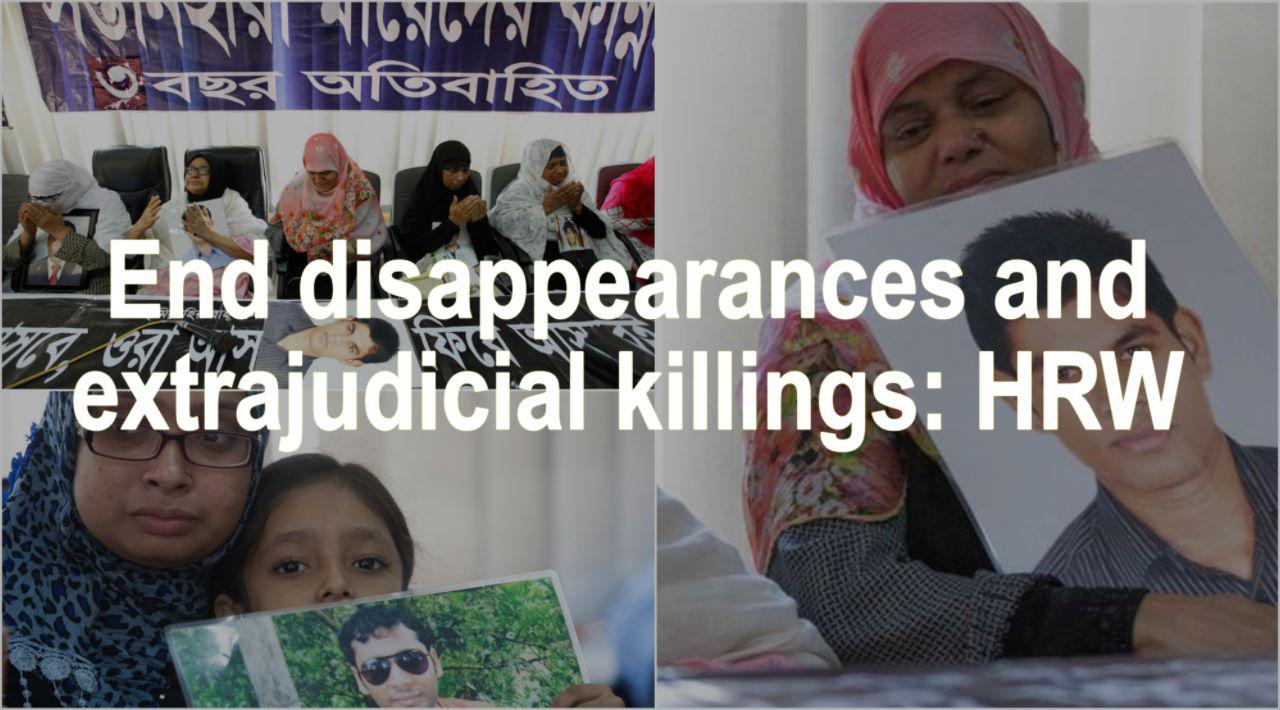
Security forces in Bangladesh have been accused of extrajudicial killings, enforced disappearances and secret detentions, including of members of the political opposition, according to a report released by Human Rights Watch on Thursday.
"People are almost always worried that they are going to disappear, they are going to be killed, and no one will know what exactly happened to them," Meenakshi Ganguly, South Asia Director of Human Rights Watch, told Al Jazeera.
"Therefore, an environment of fear, particularly among the people in political opposition and known government critics, has become intense.
"The government really needs to look into this instead of denying that things happened," she told Al Jazeera.
The New York-based rights body urged the Bangladesh government to launch an independent investigation into these allegations and "prosecute security forces responsible for such egregious rights violations".
OPINION: Divisive politics set the stage for Dhaka attack
At least 90 people have been victims of enforced disappearance last year alone, according to the 82-page report: "We Don't Have Him': Secret Detentions and Enforced Disappearances in Bangladesh".
At least 21 detainees were later reportedly killed, the report documented.
In the first five months of this year, 48 people have already been reported missing, but the government has so far denied the involvement of security forces.
"The disappearances are well-documented and reported, yet the government persists in this abhorrent practice with no regard for the rule of law," said Brad Adams, Asia director at Human Rights Watch.
"Bangladesh security forces appear to have a free hand in detaining people, deciding on their guilt or innocence, and determining their punishment, including whether they have the right to be alive."
The South Asian country's Home Minister Asaduzzaman Khan has denied his forces committed abuse.
"The government respects basic human rights as per the Bangladeshi constitution. We do not believe in enforce disappearances, secret detention and extra judicial killings," he said.
Dubbing the HRW report as "baseless" Khan said that "in many cases disappeared people went into hiding because of family feud..., and many disappeared persons have already returned to their family".
He also added that Bangladesh was "an affiliated country of the UNHRC and strictly obeyed its norms and conditions".
The director of the media and legal wing of the police unit, Rapid Action Battalion (RAB), could not be reached despite repeated attempts.
'They betrayed us'
More than 100 people, including family members and witnesses, were interviewed to document these cases.
Eyewitnesses and victims' families accused the RAB or the Detective Branch of the police (DB), for committing most of the abuses. The RAB has a long-recorded history of abuse.
In a report released in March, the United Nations Human Rights Committee criticised Bangladesh's government for a "high rate" of extrajudicial killings and enforced disappearances.
A month earlier, the United Nations Working Group on Involuntary and Enforced Disappearances called on the government to "immediately reveal the whereabouts" of three sons of opposition leaders it said were kidnapped six months earlier.
Ruhul Amin Chowdhury, who saw RAB take away his son, Adnan Chowdhury, on December 5, 2013, told HRW that he had trusted RAB to release his son the next day. "They said, 'We are taking him. We will bring him back,'" he said. "They betrayed us."
Since the current Awami League government came to power in 2009, human rights organisations have identified more than 1,300 alleged extrajudicial killings and 325 enforced disappearances.
Leading up to the 2014 general elections hundreds of people, including opposition activists, were illegally detained and held in secret detention centres, the report said.
"Since 2013 we saw a new trend: supporters of opposition political parties have been targeted, basically members of Bangladesh Nationalist Party (BNP) and Jamaat-e-Islami have been targeted," said HRW's Ganguly.
"Some Jamaat members were picked up and shot in the knees."
Nineteen members of the opposition BNP detained by the security forces weeks before the 2014 general elections continue to remain disappeared, the report says.
READ MORE: A fight to survive for Rohingya refugees in Bangladesh
Adilur Rahman Khan, a leading human rights activist, has faced harassment at the hands of government agencies after his organisation Odhikar accused security forces of extrajudicial killings in 2013. In January this year, he was charged by a local court.
Moin Khan, former minister and a senior BNP leader told Al Jazeera that "there was a gross violation of human rights in Bangladesh".
"The government just wants to cling on to power and that is why it is targeting the opposition," he said.
"Democratic norms and principles have been violated by this government. It is the lack of democratic environment that is leading to these things."
'Even the last election was not free and fair'
Bangladesh is heading for another election in less than two years time, but the current environment strikes little confidence in the opposition ranks as well as rights organisations.
Moin Khan complained that "opposition has not been allowed public association, a democratic right enshrined in the constitution".
"Even the last election was not free and fair."
Ganguly from the HRW says that for free and fair elections to happen, "targeting of political opposition must stop".
"If indeed the world wants to ensure that Bangladesh continues as a democracy where people have a voice in selecting their leaders, then the next elections should at least be held in an environment where all political parties participate."
She rued that the government was failing to acknowledge that abuses are occurring.
"We are very worried that a government which came to office promising zero tolerance for human rights violations is now enabling its security forces to commit these abuses."
Source: Al Jazeera News
http://www.aljazeera.com/news/2017/07/disappearances-extrajudicial-killings-hrw-170705191258625.html
